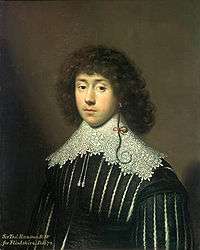Sir Thomas Hanmer, 2nd Baronet
Sir Thomas Hanmer, 2nd Baronet (1612–1678) was an English politician who sat in the House of Commons in 1640 and from 1669 to 1678. He was a Royalist during the English Civil War and raised troops for Charles I. In his personal life he was a keen horticulturist. He is not to be confused with Sir Thomas Hanmer, 2nd Baronet (1747–1828) of the second creation.[1]

Life
Hanmer was born in 1612, the eldest son of Sir John Hanmer, 1st Baronet. His father was a Member of Parliament for Flintshire and tended towards the Puritan side of Parliament. Hanmer was a page to Charles I from 1625 to 1627, and became the king's cupbearer. He was interested in horticulture and corresponded with other gardeners.[2]
With the death of his father, Hanmer inherited the Hanmer Baronetage, becoming the 2nd Baronet Hanmer. In April 1640, Hanmer was elected Member of Parliament for Flint Boroughs in the Short Parliament.[3] Despite his uncle, Roger Hanmer, supporting Parliament during the Civil War, Thomas was a Royalist and was the cup-bearer of Charles I of England; and Charles proposed to his nephew, Prince Rupert that Hanmer be made vice-president of Wales.
In 1669 Hanmer gained his second Parliamentary seat when he was elected as member for Flintshire, which he held until his death in 1678.
Family
Hanmer was married twice: his first marriage was to Elizabeth Baker, who eloped with the eccentric pamphleteer the Hon. Thomas Hervey, a son of John Hervey, 1st Earl of Bristol;[4] there were two surviving children of this marriage: a son John, who succeeded him as 3rd Baronet: and a daughter, Trevor (1636-1670), married Sir John Warner (1640-1705) of Parham, Sussex, who both converted to Catholicism; she became a Carthusian nun.[5][6][7]
Thomas Hamner married secondly Susan Hervey, daughter of Sir William Hervey, MP for Bury St. Edmunds. Of this marriage his son, William (born circa 1648 in Angers, Anjou, France), aged 15 went to Pembroke College, Oxford; he married Peregrina, daughter and co-heiress of Sir Sir Henry North, 1st Baronet, of Mildenhall, Essex.[8][9] Their children were Susanna (16 August 1676 – 23 September 1744), who married Sir Henry Bunbury of Rake Hall, Little Stanney, Cheshire;[10] and Thomas, later 4th Baronet.[11] John, the 3rd baronet died without issue in 1701; his younger brother William having already predeceased their father (the 2nd Baronet), William's son Thomas succeeded to the baronetcy.[12]
A daughter, Thomasin, married Robert Booth and died without issue on 14 May 1712.[13]
References
- National Archives: Hanmer, Sir Thomas (1747-1828) 2nd Baronet
- Karen Hearn, Cornelius Johnson (London, 2015), p. 31.
- Willis, Browne (1750). Notitia Parliamentaria, Part II: A Series or Lists of the Representatives in the several Parliaments held from the Reformation 1541, to the Restoration 1660 ... London. pp. 229–239.
- "Hervey, Thomas" in Venn, John; Venn, J. A. (1922). Alumni Cantabrigienses: A Biographical List of All Known Students, Graduates and Holders of Office at the University of Cambridge, from the Earliest Times to 1900, Volume 1, part 2: Dabbs-Juxton. Cambridge University Press.CS1 maint: ref=harv (link), p. 325.
- Jackson, Frances (1902). From hearth to cloister in the reign of Charles II : a narrative of Sir John and Lady Warner's so-much-wondered-at resolutions to leave the Anglican Church and to enter the religious life. London: Burns and Oates. p. 9
- Lady Trevor Warner. National Portrait Gallery. Accessed 22 December 2015.
- Hanmer, John Lord (1877). A Memorial of the Parish and Family of Hanmer in Flintshire, out of the thirteenth into the nineteenth century. London: privately printed at the Chiswick Press, p. 63, 91 [73, 101.
- Burke, John Bernard. A genealogical and heraldic history of the extinct and dormant baronetcies
- "Hanmer, William", in Venn & Venn 1922 p. 299.
- "Susannah Hamner". Leigh Rayment's The Peerage. Accessed 21 December 2015.
- Bunbury, Henry Edward (1838). "Memoir of Sir Thomas Hanmer". The correspondence of Sir Thomas Hanmer ... with a memoir of his life, to which are added, other relicks of a gentleman's family. London: Edward Moxon. p. 4.CS1 maint: ref=harv (link) [Bunbury was the 4th Baronet's brother-in-law.]
- Bunbury 1838, p. 4.
- Wotton, Thomas. Kimber, Edward; Richard A. Johnson (eds.) The Baronetage of England... London. (1771), p. 29.
- Sources
| Parliament of the United Kingdom | ||
|---|---|---|
| Preceded by Parliament suspended since 1629 |
Member of Parliament for Flint 1640 |
Succeeded by John Salusbury |
| Preceded by Sir Henry Conway, 1st Baronet |
Member of Parliament for Flintshire 1669–1678 |
Succeeded by Mutton Davies |
| Honorary titles | ||
| Interregnum | Custos Rotulorum of Flintshire 1660–1678 |
Succeeded by Sir Roger Mostyn |
| Baronetage of England | ||
| Preceded by Sir John Hanmer, 1st Baronet |
Baronet of Hanmer 1624–1678 |
Succeeded by Sir John Hanmer, 3rd Baronet |